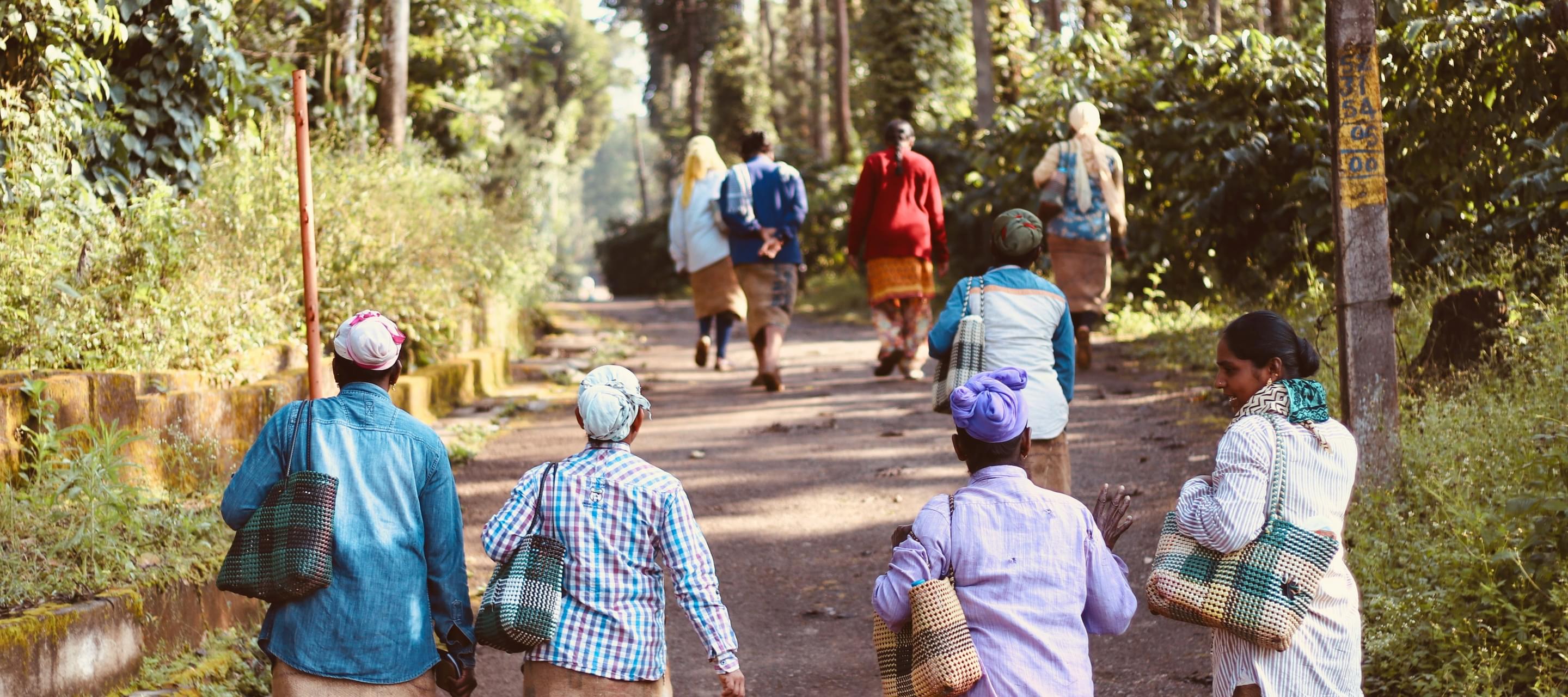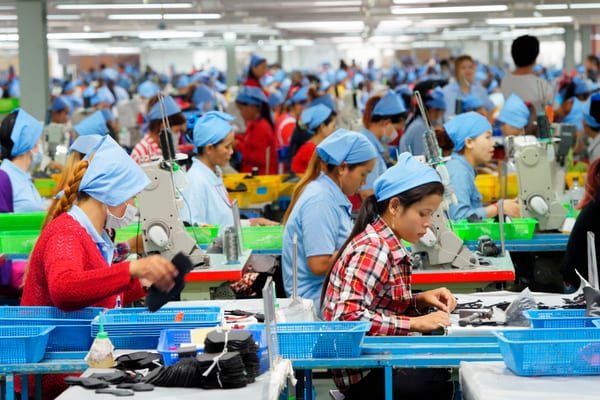Dhaka Principles for Migration With Dignity - still the cornerstone of IHRB’s work to advance migrant workers rights
3 July 2025 | 7 mins

Working to advance respect for migrant workers’ rights with colleagues and partners around the world has been central to our mission at IHRB over the past 15 years.
I will be stepping down from leading our programme on this critical issue, but IHRB’s work to engage with all those committed to protecting the rights of migrant workers will continue. This moment offers an opportunity to reflect on the journey we’ve been on together, and to consider where the evolving business and human rights landscape must now focus its efforts if we are to make real, lasting progress in protecting and empowering migrant workers around the world.
The shared challenge of protecting migrant workers most vulnerable to abuse by a range of actors isn’t going anywhere. The impacts of the climate crisis forcing displacement, as well as the under-recognition of population bulges, from unemployed young people in Sub-Saharan Africa, to ageing populations in need of care services in the West, will all result in transformative demographic shifts in the decades to come. In the time ahead, migration will continue to be a reality requiring constructive responses and shared responsibilities.
A cornerstone: Dhaka Principles for Migration with Dignity
When we first launched IHRB’s work in this area in 2010, we quickly realised that there actually wasn’t a lack of insight or guidance on what businesses should be doing within their own operations and supply chains to respect migrant worker rights. However, information was often fragmented—scattered across different sources, or was only sector specific. Bringing these disparate threads together became our first task.
In collaboration with the International Confederation of Private Employment Agencies (CIETT, now the World Employment Confederation) and the International Trade Union Confederation (ITUC), we developed a practical and accessible framework of 2+10 principles to support businesses, governments, and civil society actors throughout the entire migration cycle. This initial framework was launched at a conference on migrant workers in Dhaka, Bangladesh 2011. It later evolved into the Dhaka Principles for Migration with Dignity.
Now translated into over 34 languages, the Dhaka Principles have become a cornerstone for those seeking to understand and address the unique challenges faced by migrant workers—as well as the responsibilities of those who recruit and employ them.
Exploitation often starts during recruitment
Whilst all elements of the Dhaka Principles are important, much of our subsequent work has focused on one issue in particular: recruitment. The recruitment process for migrant workers is often flawed and, in particular, frequently includes the charging of large recruitment fees to migrant workers, which can leave them indebted before they even begin work. These significant debts can undermine the ability of workers to assert their rights and often trap them in cycles of vulnerability and exploitation.Requiring workers to pay recruitment fees can also negate progress on other labour rights issues. For example, a company committed to paying a ‘living wage’ may find that those wages are simply diverted to service debt incurred by migrant workers during recruitment.
From the outset, we championed a different recruitment model—one based on a simple premise: The Employer Pays Principle: No worker should pay for a job. The costs of recruitment should be borne not by the worker but by the employer.
Today, the Employer Pays Principle enjoys support from an increasing number of governments, companies, and international organisations. A recent success was its inclusion in the UK Government’s Transparency in Supply Chains Guidance Document under the Modern Slavery Act.
This Principle became the foundation of the Leadership Group for Responsible Recruitment, a coalition of forward-thinking companies supported by UN and civil society organisations, convened by IHRB. There are now over 400 leading businesses who have committed to this standard, all recorded on IHRB’s Responsible Recruitment Register, which lists companies with publicly available policies prohibiting recruitment fees. The Register also recognises and supports recruitment agencies that demonstrate a commitment to ethical recruitment practices.
Yet despite this important progress, we know that adoption is far from universal, and that policy commitments on paper do not always translate to meaningful change in practice. Initiatives like the Annual IHRB Global Forum for Responsible Recruitment bring together businesses, governments, and civil society to promote change, share solutions, raise the bar, and keep ethical recruitment on the global agenda.
An increasing number of initiatives are now aiming to ensure repayment of recruitment and related fees to workers.This is a welcome development, but it is important to see such compensation for what it is - an admission of failure. For too long, many companies haven’t undertaken due diligence to ensure appropriate provision in the first instance. Much more still needs to be done to ensure the Employer Pays Principle becomes universal practice in the recruitment of migrant workers from the outset.
Addressing unique challenges facing women migrant workers
There are currently nearly 170 million migrant workers in the world, and of these, approximately 70 million are women. Many of these women are from racially and culturally marginalised communities, and many are in informal employment or are undertaking low-waged and often perceived low-value work. Their type of employment and status can add to their vulnerability. Women migrant workers face challenges common to many women in the workplace such as gender-based discrimination, access to jobs, promotions and training, as well as verbal, physical and sexual harassment and abuse. For the many women migrant workers employed as domestic workers, this abuse can remain even more hidden.But migration for work can offer women opportunities that they may not find in patriarchal families, communities or certain countries. Migration may be a liberating and empowering experience, providing it is organised and managed with respect for rights.
Our gender review of the Dhaka Principles last year resulted in a significant number of amendments and additions to the existing Implementation Guidance highlighting additional challenges faced by women migrant workers. In 2025, we also produced a Short Guide for Recruitment Agencies on how these companies can contribute to respecting the rights of women using their services, whilst maintaining their safety during recruitment and deployment abroad. There is much work still to be done to protect women who decide to migrate, and our work at IHRB will continue to focus on helping employers respect their rights at every stage along the way.
Looking ahead - how do we make migration safe and welcoming for all?
Going forward, migration for work will clearly continue to be a significant phenomenon in our world. This is due to a number of clear drivers. One is the climate crisis, where environmental and economic shocks, alongside our adaptations to it, will see increased numbers of workers on the move. Increasingly this will mean workers moving with their families, which has implications for community planning and social cohesion. Large numbers of migrants will also form much of the workforce deployed on clean up and rebuild operations following climate induced and other disasters. The “emergency” nature of these situations potentially may lead to a suspension of normal labour rights and safety protocols that will have enormous implications.
Another major, though perhaps still under-recognised, driver of migration is demographic change. In Sub-Saharan Africa, 70% of the population is under the age of 30, concentrated largely in regions with limited economic opportunities and few viable pathways to secure futures. This young, increasingly connected, and more informed population, will be better able and more motivated to seek employment opportunities abroad than previous generations. At the same time, many high-income countries, including those in Northern Europe, East Asia, and North America, are facing the dual challenges of ageing populations and declining birth rates.
These demographic shifts will result in growing reliance on migrant workers: not only to provide essential care to ageing populations, but also to sustain economic vitality and tax revenues needed to support social welfare systems.
Despite clear structural needs, and local populations still reluctant to take jobs currently filled by migrants, labour migration remains contentious in many countries withXenophobia and anti-migrant backlash on the rise. Few politicians seem willing to make the case for more planned migration and, whilst businesses may lobby governments privately, few CEOs are prepared to make public statements in support of more open migration policies that would be safe and beneficial for home and host nations alike.
Many of those who do migrate in search of a better life could find themselves caught in perpetual cycles of migration—unable to obtain citizenship in host countries, yet reluctant or unable to return home due to poverty, lack of opportunity, conflict, or climate-related impacts. These “ever-migrants” risk becoming a permanent, invisible underclass in many countries, indispensable to national economies, but denied full recognition, citizenship or equal rights.
It is critical for governments to take the steps needed to ensure legal, safe, professionally-managed labour migration pathways that protect the rights of migrant workers. They must also do more to reinforce existing commitments and work together to demonstrate how migrant workers contribute to development around the world. The 2018 UN Global Compact for Safe Orderly and Regular Migration provides an effective framework for governments to work cooperatively to do so. Whilst both the International Labour Organisation and the International Organisation for Migration provide vital support and opportunities to improve practice on the ground. Businesses too have a clear role in supporting and promoting good practices and the benefits of responsible migration policies. They have a vested interest in successful migration management and should speak up individually and collectively to counter growing anti-immigrant sentiments.
The systems we develop can help deliver greater social cohesion, opportunities and growth for all. But a lack of such cooperation in the time ahead will result in migrant workers and those who rely on their hard work being trapped in ongoing cycles of abuse and exploitation.
I’m proud of the progress we at IHRB have made over the past 15 years in raising awareness about the roles and responsibilities of businesses for respecting migrant workers’ rights, and the importance of collective action in developing approaches that can make a positive difference in their lives. New challenges are on the horizon, even as old ones remain. But at the heart of these challenges, the principles for change are as simple as they always have been. The premise of our foundational document - the Dhaka Principles for Migration With Dignity - still rings true. It’s about respect, it's about rights and - it’s about dignity for all workers.



